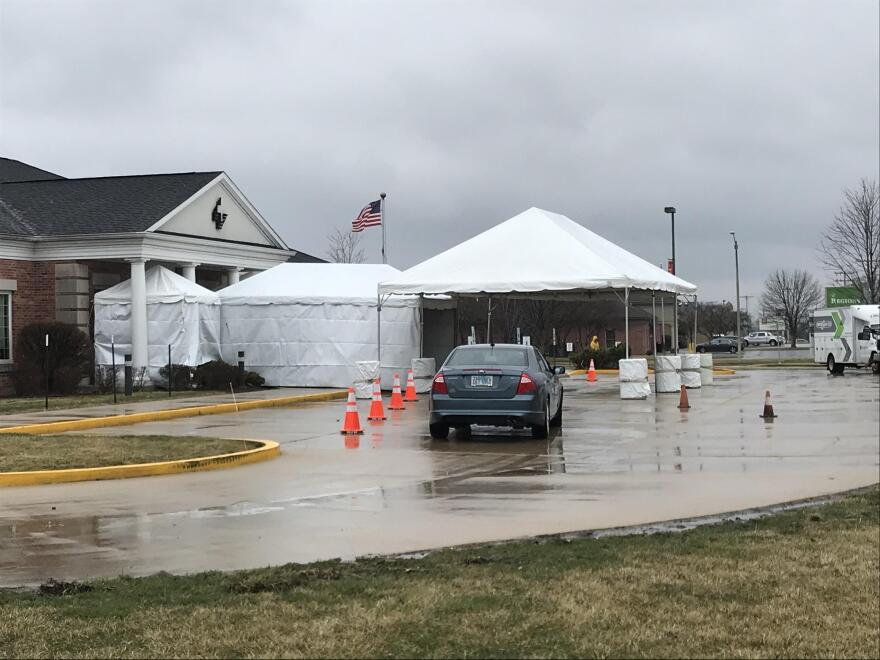More than two months after Gov. J.B. Pritzker declared testing would be key to Illinois’ response to the COVID-19 pandemic, coronavirus testing is still limited in Sangamon County.
Meanwhile, state officials report more than 13,600 tests done in the county. Local officials, however, estimate that with repeat tests and people from outside the county limits screened here, only 5,600 individual Sangamon County residents have been tested.
A look at the numbers from one recent week provides a window into the complexities underlying the stats published by health authorities.
Several testing sites and Springfield’s hospitals conducted 2,245 tests between May 10 and May 16, according to data from the testing facilities.
Of those, about half are county residents who are getting screened for the first time, according to numbers from the Sangamon County Department of Public Health.
The rest could be first responders, nursing home aides or others who get screened repeatedly for their jobs; people who previously tested negative but still show symptoms of the disease; or people who live outside of Sangamon County, said Gail O’Neill, the department’s director.
“We were seeing that by watching the person, it wasn't uncommon for people to have two or three tests,” O’Neill said.
The county tracks both overall specimens collected and individuals tested, said Dr. Kristin Delfino, a research professor with the Southern Illinois University School of Medicine’s Department of Surgery.
“If you want to assess how testing is increasing, you would want to look at how many tests are being done each day for productivity,” said Delfino, who is working with the county to organize data collection and reporting on the coronavirus.
But in order to get an accurate picture of how the disease has spread in the community, the county tracks testing by each individual. The usefulness of this approach is shown by testing at The Villas, a long-term care facility in Sherman experiencing an outbreak.
“What gets murky including all repeats is, for example, testing 100 of the same nursing home residents every 7 days for 3 weeks, which would generate 300 test results,” Delfino said. “That 300 can give a (biased) percent positive/negative.”
Right now, the county’s positivity rate is 6%.
Sangamon County COVID-19 Tests
Infogram
During the week of May 10 to May 16, a total of 2,878 tests were done in Sangamon County, according to data collected by NPR Illinois from the four testing sites and hospitals.
That includes 630 tests done at the drive-through facility run by Walgreens and funded by the federal government.
The site provides detailed information about those tested to the state health department, but not to the local health department, so a spokesman for the county said they are unsure how many are Sangamon County residents. A Walgreens spokeswoman says the county can access the information from the state.
Availability and Criteria
Testing is still limited in Sangamon County, despite two more facilities opening since April and the addition of rapid testing machines at Memorial Medical Center and Walgreens.
The most recent facilities to offer coronavirus screening are drive-through sites – the Walgreens on North Ninth Street and one run by SIU Medicine in the county health department’s parking lot.
Memorial Health System offers testing at its respiratory clinic on South Sixth Street, while HSHS St. John’s offers it at its priority care clinic on MacArthur Boulevard.
“We’ve continued to struggle here and in other parts of the country with having enough swabs to really say I can test everyone,” said Dr. Linda Jones, the vice president of ancillary operations at Memorial Health System who has her doctorate in nursing science.
She said the swabs and reagents used to safely transport the swabs to the lab for analysis continue to be in short supply.
Criteria for who can get tested varies by site. Anyone over 18 can be screened at the Walgreens site, which is using rapid, self-administered swabs from Abbott Labs. Results are usually reported to patients within a day.

Heather Fitzgerald, a spokeswoman for the Walgreens site, said childcare workers, first responders and people who have symptoms and want to know if they’re infected have used their services. She said their capacity is between 170 and 180 tests a day, but they’ve only been doing 100 to 150 tests per day.
“I see us as being a solution for many different aspects of getting our community back to work,” she said.
Anyone who has symptoms or has been exposed to a person with a confirmed COVID-19 case can get tested at the SIU Medicine facility. The Memorial and HSHS St. John’s clinics require evaluation by a physician or other medical provider. The county has more information on its website.
“I would love nothing better than if thousands of swabs dropped from the sky,” Jones said. But for now, she said she’s closely tracking how many they have and prioritizing them.
“I can’t allow individuals who may be active with infection to be circulating in the community. I’ve got to get them tested and get them isolated to try to break the chain of the disease spread,” she said.
The rapid testing at Memorial Medical Center, with a system from Cepheid, is prioritized for patients in the hospital, Jones said. That’s in order to protect hospital workers and conserve personal protective equipment, which has been hard to get at times.
Memorial began using rapid tests, which can deliver results in under an hour, on April 21, and Jones said they’ve only gotten additional supplies from the vendor once since then.
For now, the sites are only doing tests that confirm if a person currently has COVID-19. Jones said that needs to be expanded, but she'd also like to see antibody tests, to understand how far the disease previously spread throughout the community.
“We know there probably is a large population that was never symptomatic and didn’t know they had this,” Jones said.






